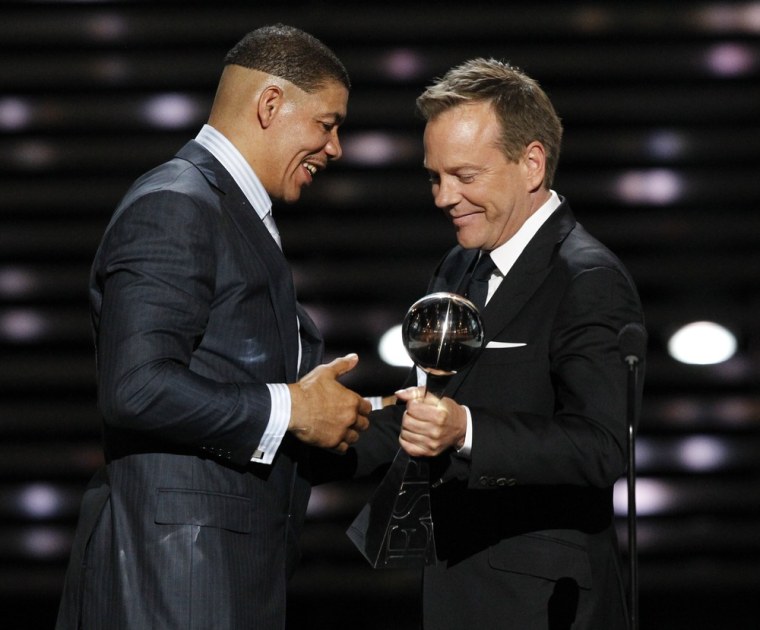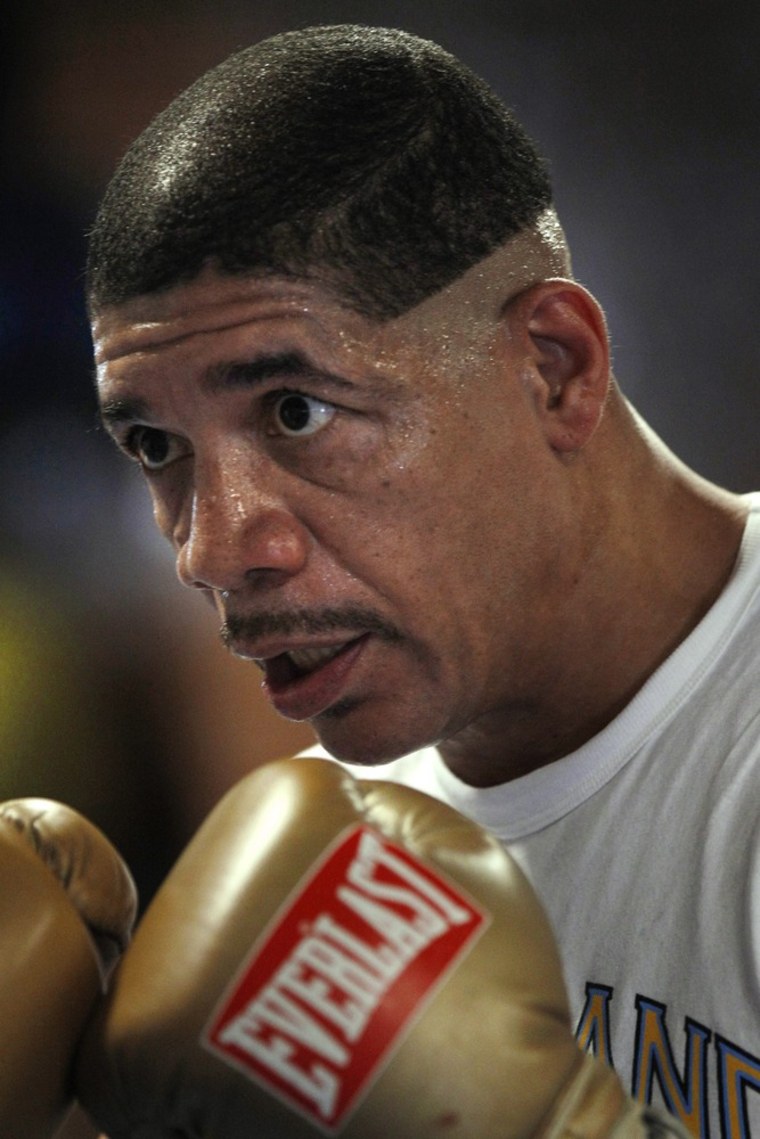The television crew had him up at dawn doing the Rocky fandango, dashing up the 72 stone steps of the Philadelphia Museum of Art and dancing around in triumph like another over-the-hill, underdog pugilist who had made it big.
Cliché or not, it is hard not to imagine the familiar trumpet score along with the thwock, thwock, thwock of fists on punching bags as Dewey Bozella trains for one of the least likely boxing matches in history.
After 26 years in New York State prisons, and two years after he was exonerated of murder, Mr. Bozella will make his professional boxing debut on Saturday in Los Angeles, at age 52, on the undercard of the light-heavyweight champion Bernard Hopkins. (A mere 46 himself, Mr. Hopkins became the oldest fighter to win a major world championship this May.)
Mr. Bozella’s other fight, in which he is seeking compensation for the half of his life he spent behind bars, may be even more daunting than chasing victory in the ring.
'Never give up'
But for now, Mr. Bozella is focused on what he says will be his one and only professional bout.
“I want to go out there and give 100 percent and then move on with my life,” he said. “This is not a career move. It’s a personal move and a way to let people know to never give up on their dreams. My favorite quote is ‘Don’t let fear determine who you are and never let where you come from determine where you’re going.’ That’s what this is about.”
The product of a violent broken family and a hard life on the streets, Mr. Bozella was a troubled 18-year-old in 1977 when Emma Crapser, 92, was murdered in her Poughkeepsie, N.Y., home after returning from playing bingo. Six years later, based almost entirely on the testimony of two criminals who repeatedly changed their stories, he was convicted of the murder.
There was no physical evidence implicating Mr. Bozella. Instead, there was the fingerprint of another man, Donald Wise, who was later convicted of committing a nearly identical murder of another elderly woman in the same neighborhood. Mr. Bozella was retried in 1990, and was offered a deal that would let him go free in exchange for an admission that he committed the crime. He refused. A jury convicted him again.
At Sing Sing, he earned a bachelor’s degree from Mercy College and a master’s from the New York Theological Seminary.
And he boxed in the prison’s “Death House,” once the scene of electrocutions, then a boxing ring, where he became Sing Sing’s light-heavyweight champion. At parole hearings, he repeatedly refused to express remorse for the crime he did not commit. He would get out one way, he said, either in a box or as an exonerated man. The box seemed more likely.
In the end, he was saved by a miracle. The Innocence Project, a legal clinic dedicated to overturning wrongful convictions, believing in his case but unable to pursue it absent DNA evidence, referred it to the law firm WilmerHale.
Lawyers there eventually found the Poughkeepsie police lieutenant who had investigated the case. He had retired, and Mr. Bozella’s was the only file he had saved. It included numerous pieces of evidence favorable to Mr. Bozella that had not been turned over to his lawyers. On Oct. 28, 2009, he walked out of the courthouse in Poughkeepsie finally a free man.
Practice makes perfect
He struggled to find work, eventually counseling former convicts while teaching boxing at a Newburgh, N.Y., gym until ESPN became interested in his story. In July, at its annual ESPY Awards, he was given its Arthur Ashe Courage Award, whose past recipients have included Muhammad Ali, Pat Tillman and Nelson Mandela. The offer to box professionally came as a result of that appearance.

But when he took the rigorous California State Athletic Commission test on Aug. 24 to get licensed to box in the state, he failed. After Labor Day, he began working out in Philadelphia with the trainers for Mr. Hopkins. They were skeptical.
“I’m thinking, ‘I’m going to kill this old guy,’” said Danny Davis, one of Mr. Hopkins’s trainers. “There’s no way this guy can make it through my training.”
But Mr. Bozella got tougher, leaner and more nimble, dropping 10 pounds in little more than a week. He sparred with, and took serious lumps from, a world-class fighter: Lajuan Simon, a middleweight title contender. Mr. Bozella took the test again on Sept. 29. This time he passed.
Officials said Mr. Bozella was believed to be the oldest fighter ever licensed to box in California. Fighters that age are extremely rare but hardly unknown. “The Ultimate Book of Boxing Lists,” by Bert Randolph Sugar and Teddy Atlas, has a section on “Boxing’s Greatest Methuselahs” that includes Mr. Hopkins; Jem Mace, the legendary 19th-century English boxer who fought at 59; and Saoul Mamby, a former junior welterweight titleholder who fought in 2008 at the age of 60, making him the oldest fighter ever to appear in an officially sanctioned bout.
Mr. Bozella, a cruiserweight — between light-heavyweights and heavyweights — will not be fighting for a championship; he is taking on Larry Hopkins, 30, of Houston, who is 0-3 as a professional (and is not related to Bernard Hopkins). His purse in the pay-per-view bout will be in the very low four figures.
'The pain, blood and bruises'
But even if hype and marketing are as much a part of boxing as quick feet and sharp jabs, Mr. Bozella said the bout was anything but a stunt.
“You’ve seen the workout I went through, the pain, blood and bruises I’m getting,” he said after four rounds sparring with Mr. Simon last week. “No one’s giving me nothing for free. I can go out there and get knocked out, or I can knock the other guy out. It’s that simple.”
Mr. Bozella hopes to open his own gym as a way to mentor youngsters, but beyond its Hollywood touches, his feel-good story turns cloudier. The day after he passed the boxing test, a federal judge threw out his lawsuit against Dutchess County and the City of Poughkeepsie over the evidence that was not turned over to his lawyers.
The decision was primarily based on a controversial Supreme Court ruling in the case of Connick v. Thompson. By a 5-to-4 margin, the court, in a decision written by Justice Clarence Thomas in March, threw out a $14 million jury award to a former death row inmate freed after prosecutorial misconduct came to light.
The decision stated that only a pattern of misconduct in properly turning over evidence could warrant financial compensation, no matter how egregious the misconduct against a single defendant.
“I’m not going to disrespect the courts,” Mr. Bozella said. “I’d just like the justice system to be fair. Same thing with boxing. If the judges are fair, then the real winner wins. Just be fair. That’s it.”
This story, "," first appeared in The New York Times.
